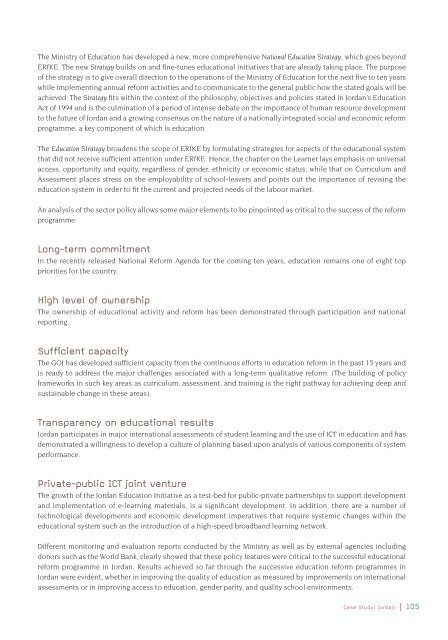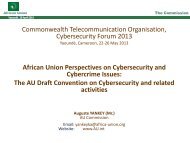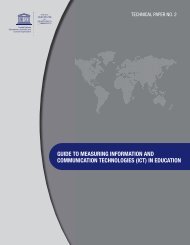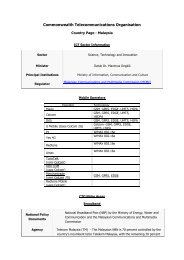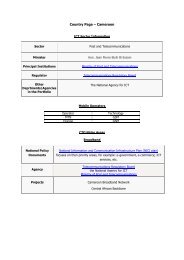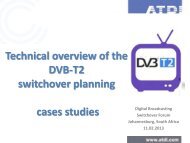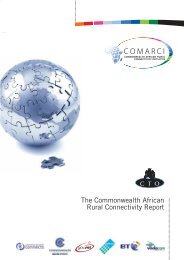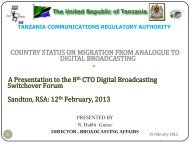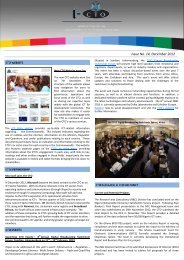Transforming education: the power of ICT policies - Commonwealth ...
Transforming education: the power of ICT policies - Commonwealth ...
Transforming education: the power of ICT policies - Commonwealth ...
Create successful ePaper yourself
Turn your PDF publications into a flip-book with our unique Google optimized e-Paper software.
The Ministry <strong>of</strong> Education has developed a new, more comprehensive National Education Strategy, which goes beyond<br />
ERfKE. The new Strategy builds on and fi ne-tunes <strong>education</strong>al initiatives that are already taking place. The purpose<br />
<strong>of</strong> <strong>the</strong> strategy is to give overall direction to <strong>the</strong> operations <strong>of</strong> <strong>the</strong> Ministry <strong>of</strong> Education for <strong>the</strong> next fi ve to ten years<br />
while implementing annual reform activities and to communicate to <strong>the</strong> general public how <strong>the</strong> stated goals will be<br />
achieved. The Strategy fi ts within <strong>the</strong> context <strong>of</strong> <strong>the</strong> philosophy, objectives and <strong>policies</strong> stated in Jordan’s Education<br />
Act <strong>of</strong> 1994 and is <strong>the</strong> culmination <strong>of</strong> a period <strong>of</strong> intense debate on <strong>the</strong> importance <strong>of</strong> human resource development<br />
to <strong>the</strong> future <strong>of</strong> Jordan and a growing consensus on <strong>the</strong> nature <strong>of</strong> a nationally integrated social and economic reform<br />
programme, a key component <strong>of</strong> which is <strong>education</strong>.<br />
The Education Strategy broadens <strong>the</strong> scope <strong>of</strong> ERfKE by formulating strategies for aspects <strong>of</strong> <strong>the</strong> <strong>education</strong>al system<br />
that did not receive suffi cient attention under ERfKE. Hence, <strong>the</strong> chapter on <strong>the</strong> Learner lays emphasis on universal<br />
access, opportunity and equity, regardless <strong>of</strong> gender, ethnicity or economic status; while that on Curriculum and<br />
Assessment places stress on <strong>the</strong> employability <strong>of</strong> school-leavers and points out <strong>the</strong> importance <strong>of</strong> revising <strong>the</strong><br />
<strong>education</strong> system in order to fi t <strong>the</strong> current and projected needs <strong>of</strong> <strong>the</strong> labour market.<br />
An analysis <strong>of</strong> <strong>the</strong> sector policy allows some major elements to be pinpointed as critical to <strong>the</strong> success <strong>of</strong> <strong>the</strong> reform<br />
programme:<br />
Long-term commitment<br />
In <strong>the</strong> recently released National Reform Agenda for <strong>the</strong> coming ten years, <strong>education</strong> remains one <strong>of</strong> eight top<br />
priorities for <strong>the</strong> country.<br />
High level <strong>of</strong> ownership<br />
The ownership <strong>of</strong> <strong>education</strong>al activity and reform has been demonstrated through participation and national<br />
reporting.<br />
Suffi cient capacity<br />
The GOJ has developed suffi cient capacity from <strong>the</strong> continuous efforts in <strong>education</strong> reform in <strong>the</strong> past 15 years and<br />
is ready to address <strong>the</strong> major challenges associated with a long-term qualitative reform. (The building <strong>of</strong> policy<br />
frameworks in such key areas as curriculum, assessment, and training is <strong>the</strong> right pathway for achieving deep and<br />
sustainable change in <strong>the</strong>se areas).<br />
Transparency on <strong>education</strong>al results<br />
Jordan participates in major international assessments <strong>of</strong> student learning and <strong>the</strong> use <strong>of</strong> <strong>ICT</strong> in <strong>education</strong> and has<br />
demonstrated a willingness to develop a culture <strong>of</strong> planning based upon analysis <strong>of</strong> various components <strong>of</strong> system<br />
performance.<br />
Private-public <strong>ICT</strong> joint venture<br />
The growth <strong>of</strong> <strong>the</strong> Jordan Education Initiative as a test-bed for public-private partnerships to support development<br />
and implementation <strong>of</strong> e-learning materials, is a signifi cant development. In addition, <strong>the</strong>re are a number <strong>of</strong><br />
technological developments and economic development imperatives that require systemic changes within <strong>the</strong><br />
<strong>education</strong>al system such as <strong>the</strong> introduction <strong>of</strong> a high-speed broadband learning network.<br />
Different monitoring and evaluation reports conducted by <strong>the</strong> Ministry as well as by external agencies including<br />
donors such as <strong>the</strong> World Bank, clearly showed that <strong>the</strong>se policy features were critical to <strong>the</strong> successful <strong>education</strong>al<br />
reform programme in Jordan. Results achieved so far through <strong>the</strong> successive <strong>education</strong> reform programmes in<br />
Jordan were evident, whe<strong>the</strong>r in improving <strong>the</strong> quality <strong>of</strong> <strong>education</strong> as measured by improvements on international<br />
assessments or in improving access to <strong>education</strong>, gender parity, and quality school environments.<br />
Case Study: Jordan | 105


